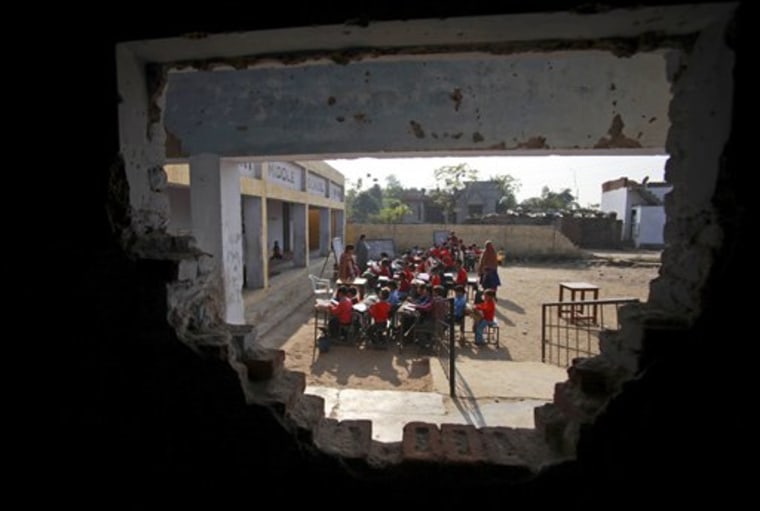In a country where charity more typically goes to the household help, an Indian tech mogul's pledge to donate nearly $2 billion to fund education programs for the poor was a bombshell.
It could also be a sign of — and a nudge to — change: India's burgeoning class of super rich might finally be ready to do more for the nation's teeming poor.
"This is a seminal event and a great signal to India as a whole that there are things you can do with your wealth other than pass it on to your heirs," said Arpan Sheth, a partner at Bain & Company who has studied charitable giving in India.
Azim Premji, chairman of Wipro Ltd., India's third-largest software services exporter, said Wednesday he would transfer 213 million shares worth 88.4 billion rupees ($1.95 billion) in the company to the Azim Premji Foundation by Dec. 7. The trust is controlled by Premji, and he will continue to retain the voting rights of the transferred shares.
Forbes lists Premji as the 3rd richest Indian and the 28th richest person in the world with an estimated net worth of more than $17 billion.
His gift is the country's largest lump-sum donation in modern times.
India is the second-fastest growing major economy after China, but charitable giving has lagged behind. Individual and corporate donations made up only 10 percent of giving in 2009, compared with 75 percent in the U.S., according to a Bain & Company study. The rest comes from foreign organizations and the government.
In total, giving was $7.5 billion, or 0.6 percent of GDP, lagging the U.S., U.K., and Canada, but ahead of Brazil and China, Bain estimated.
Philanthropy among the wealthy is entrenched in countries like the U.S., which has tax structures that encourage giving, and American billionaires Bill Gates and Warren Buffett have set out to help sow that tradition in newly wealthy countries. In September, they visited China and are planning a trip to India next year.
Anurag Behar, the co-chief executive of Premji's foundation, says he hopes other Indians follow in his boss's footsteps.
"There are so many staggeringly wealthy people in this country. They don't need all that money," he said.
He added that the decision to give was sparked by a simple question: "I've made so much money, what am I going to do with it?"
The new endowment will vastly increase the foundation's resources, allowing it to fund a new university focused on training educators and ambitiously expand its rural schools programs, which it runs in conjunction with various state governments, he said.
India has a long tradition of giving, but traditionally charity has stayed close to home, with families supporting their household help or local religious institutions.
With the creation of a new class of super wealthy entrepreneurs — Forbes says the country now has 69 billionaires — that's starting to change.
Premji's donation is the most extreme example of how India's rich — long criticized for shirking its responsibilities to the country's struggling masses — are beginning to dole out ever-larger sums to institutions that can take on large-scale social problems, like education and health care, analysts say.
Sheth, the Bain partner who wrote the report about philanthropy in India, said part of the reason rich Indians seem to consume more avidly than they give is that they've accumulated wealth relatively recently. India's boom began after economic reforms in the early 1990s, while in other countries it has taken 50 to 100 years for philanthropy to mature.
"Wealth formation happens first. Philanthropy happens after that," Sheth said.
Premji's donation comes on the heels of two other high-profile but controversial gifts: Mahindra & Mahindra managing director Anand Mahindra gave $10 million to Harvard University and Ratan Tata's Tata group gave $50 million to Harvard Business School. Many here asked why they were sending millions to Harvard, when the need is so great here at home. Both Tata and Mahindra have robust giving programs domestically.
Corporate foundations in India have also become commonplace. Even India's richest man — known better for building a 27-story home than for his social vision — started a foundation last year. Mukesh Ambani's company, Reliance Industries, has pledged to double the foundation's initial endowment of 5 billion rupees ($110.4 million).
Deval Sanghavi, who left his career as an investment banker to found Dasra, a Mumbai-based philanthropy foundation, says the accumulating zeros are evidence of a changing mindset among the rich.
"There was a belief in India that you have to help your community first," he said. "This newer generation of individuals has realized that their community is not the village or caste they come from but India as a whole. They're also realizing that for India to take shape and form as a developed country and superpower, investments need to be made in education and health."
In September, Gates, the Microsoft co-founder, and Buffett, chairman of Berkshire Hathaway, traveled to China to persuade the superrich there to donate some of their wealth to charity.
"They failed in China, but I think they might make a dent over here in India," said Noshir Dadrawala, chief executive of the Center for Advancement of Philanthropy, which advises charities on legal and governance issues.
"India might be the philanthropic capital of the world one day," he said.
